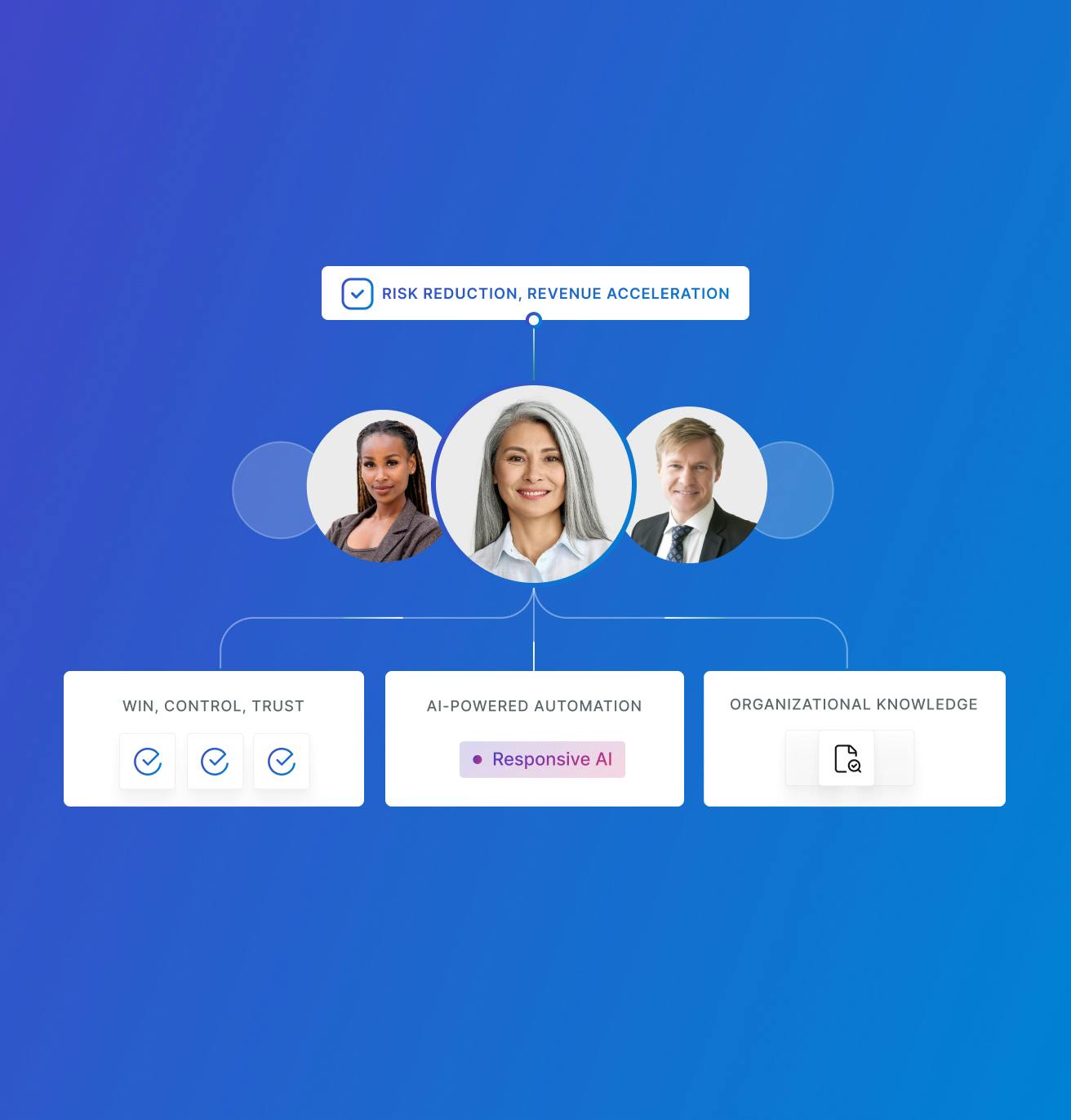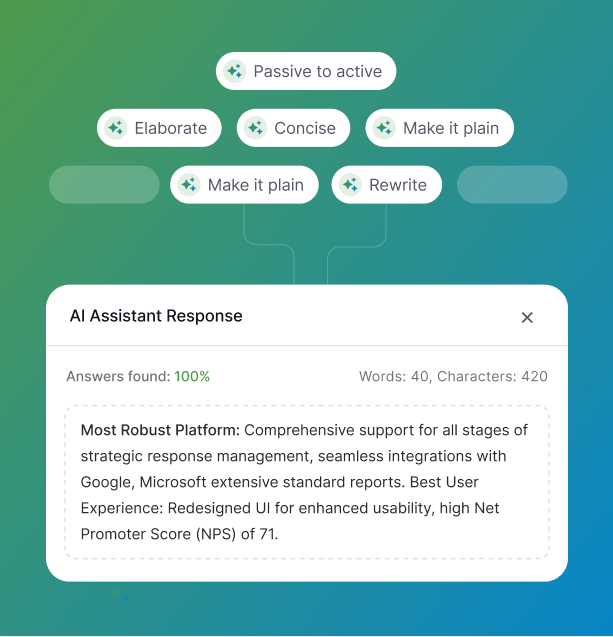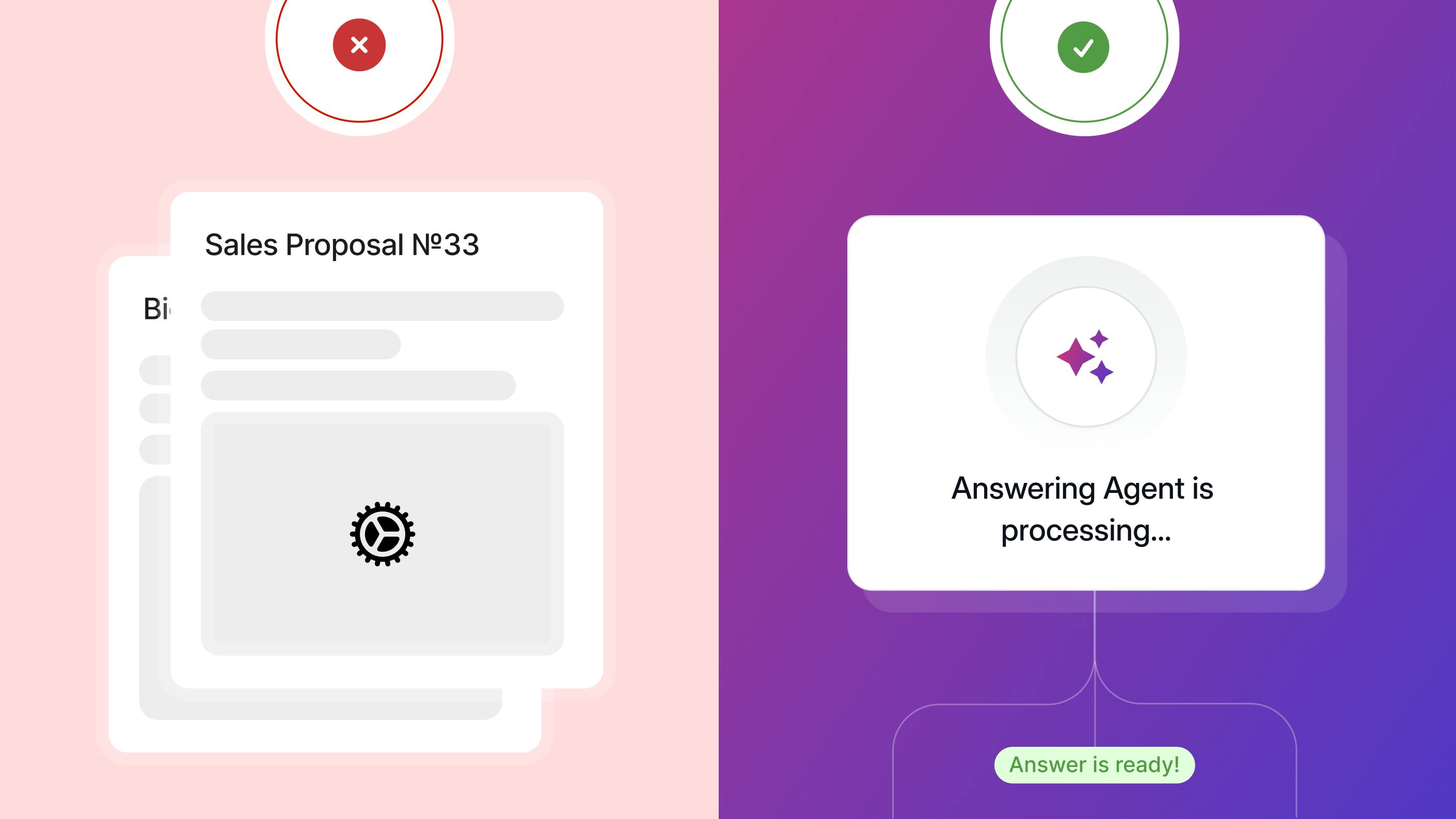Bid response has shifted from a static, document-heavy process into a strategic function that directly impacts win rates and operational efficiency.
- 70% of companies participating in this study report an annual increase in revenue generated through RFPs and other strategic responses.
- 48% or company revenue is tied to RFPs, bids, tenders, and proposals.
Now, bid teams expect precision, data-backed decision-making, and rapid turnaround times.
To remain competitive, organizations need to integrate AI-driven automation, centralized content management, and advanced collaboration tools. These innovations don't just improve efficiency — they create a more intelligent, adaptive response process that aligns with buyer expectations and business objectives.
The evolution of bid response technology
Previously, response teams depended on static repositories of past proposals, spending hours manually searching for relevant content and reformatting responses for each new bid.
Now, automation tools have changed this process completely, helping teams create accurate, data-driven responses much faster. AI-driven bid response platforms examine past submissions, recommend the most appropriate content, and improve proposals based on what has worked well with evaluators before. These improvements address common problems like keeping content consistent, decreasing manual work, and meeting complex bid requirements.
As pressure grows to deliver quality responses quickly, AI-powered bid response technology gives companies an advantage by improving team collaboration and making proposals more accurate.

Software in the bid tech revolution
Bid response technology has evolved remarkably over the past decade, moving from basic content management systems to comprehensive automation platforms that enhance the proposal process from start to finish.
Early systems mainly served as storage repositories, requiring teams to manually find and adapt content for each new opportunity. Modern bid response tools now include AI capabilities that automatically suggest relevant content based on the specific request, significantly reducing the time spent searching through databases.
According to experts, these advancements address several persistent challenges in bid management, including content consistency, knowledge retention when team members leave, and the pressure to produce more responses with fewer resources. The integration of AI in proposal workflows has allowed teams to focus on strategy rather than administrative tasks, with some organizations reporting response time reductions of up to 40%. Additionally, these advanced systems provide greater visibility into the proposal creation process, allowing managers to identify bottlenecks and allocate resources more effectively.
As procurement requirements grow increasingly complex, each of these evolving technologies help bid teams maintain compliance while producing higher-quality responses that better address evaluators' specific criteria.
Under the hood: the tech driving bid response innovation
New technologies aren't just making responses faster but redefining how bid teams engage with procurement processes. Here’s what’s driving this innovation:
AI-powered insights
Organizations are implementing AI-powered insights in several ways to see measurable improvements in bid performance, including refining content recommendations and automating time-consuming review processes.
For example, AI-powered content management systems can automatically tag and organize proposal documents, helping teams quickly access the most relevant, high-quality content. This capability ensures accuracy and consistency across all responses, which is especially valuable when managing multiple bids simultaneously.
Data-driven responses
Organizations that use analytics to shape their bid strategies gain a competitive edge. This is because performance metrics from past responses can help teams refine their messaging, ensuring that proposals align with what evaluators prioritize.
According to the research, bid teams that leverage data-driven decision-making improve response consistency and reduce turnaround times, ultimately leading to higher success rates. In fact, 80% of leading companies utilize data and analytics from response systems to enhance processes and boost win rates, compared to only 61% of less successful organizations.
Enhanced collaboration
Bid responses often require input from multiple teams, but disjointed workflows can create bottlenecks. Modern bid platforms integrate collaboration tools that enable effective teamwork and straightforward approval processes.
Best practices emphasize the importance of structured workflows, which allow contributors to work in parallel, reducing inefficiencies and enhancing submission quality. For example, in-app @communication and simplified input and review cycles keep everyone working together, even when globally distributed. Fewer obstacles and procedural hurdles mean better team flow.
AI-enabled content library
Maintaining consistency across responses is a challenge, especially for large organizations managing multiple bids simultaneously. AI-powered content libraries provide accurate, pre-approved answers, reducing redundant work and ensuring compliance.
Proposal experts recommend maintaining an AI-enhanced content repository to dynamically suggest the best responses based on previous bid performance. For example, Microsoft's Proposal Resource Library has enabled 18,000 users to quickly access vetted, curated content, resulting in significant productivity gains and more efficient operations.
End-to-end visibility
Tracking bid progress, identifying bottlenecks, and ensuring compliance are essential aspects of bid management. AI-driven dashboards offer full visibility into ongoing and past responses, allowing teams to continuously refine their strategies.
Experts in the field highlight the growing role of real-time analytics in monitoring bid health and improving success rates. For example, Responsive's custom dashboards and personalized reporting enable bid and proposal teams to monitor performance metrics, identify areas for improvement, and spot trends in real time.
Integrated project management
Managing multiple bid deadlines, assigning responsibilities, and ensuring timely submissions require a structured approach. Integrated project management tools within bid response platforms simplify task tracking and team coordination. Strategic response experts emphasize the necessity of aligning bid management tools with overall business objectives to optimize efficiency and accountability.
Bid/no-bid decision framework
A critical aspect of bid response innovation is knowing when to pursue a bid and when to decline. Making a bid/no-bid decision requires evaluating strategic fit, resource availability, and competitive positioning.
A structured approach ensures bid teams invest their time and effort in opportunities with the highest likelihood of success, minimizing wasted resources and improving overall win rates. One such approach is implementing a bid/no-bid decision matrix which can help organizations objectively assess each opportunity's potential, leading to more strategic pursuits and higher win rates.
How are leaders winning bids in the age of AI?
How bid response leaders can maximize innovation
Successful bid teams understand that technology alone isn't enough — they must also evolve their approach. Here are some quick yet important tips to keep in mind:
- Adopt an AI-first mindset: Teams that integrate AI into their response workflows gain efficiency and strategic advantages.
- Prioritize data-driven decision-making: Using analytics to refine responses helps improve bid win rates.
- Foster a collaborative culture: Encouraging cross-functional input strengthens response quality and compliance.
- Promote ongoing adaptation: Regularly updating strategies ensures alignment with shifting procurement trends.
- Design for scale: Choosing flexible solutions allows organizations to expand response capabilities without increasing complexity.
These strategies not only improve immediate response quality but also position teams for long-term success in a competitive bid environment.

Future projections for bid response
This is just the beginning and you can count on ongoing changes to bid response processes. Future trends we predict include:
Automation as standard
Manual bid assembly will become obsolete as AI-driven tools take over repetitive tasks. Gartner's 2025 technology trends highlight "Agentic AI," which refers to autonomous AI systems capable of planning and executing tasks to achieve user-defined goals, thereby enhancing productivity across organizations.
Advanced personalization
AI will enable highly specific responses that address particular buyer preferences. Keep in mind that AI is only as "smart" as its input so this aspect is highly reliant on the content that it draws from to generate responses!
Single source of truth governance
Organizations will rely on centralized content management to maintain accuracy and compliance across bids. Gartner also emphasizes "AI Governance Platforms" as essential for managing the legal, ethical, and operational performance of AI systems, ensuring that content remains accurate and compliant throughout the bid process. Experts anticipate that these trends will redefine procurement strategies in the coming years.
Responsive: An all-in-one bid response solution
Responsive provides a comprehensive platform designed to support bid teams at every stage of the response process and remains committed to evolving as the bid response universe does. By integrating AI-driven insights, effective collaboration, and centralized content management, Responsive ensures that your team can stay focused on your strategy and growth while submitting high-quality proposals efficiently.
Using Responsive, you can leverage:
- AI-driven recommendations that enhance response strategies.
- Integrated workflow automation for improved efficiency.
- A centralized content library to ensure consistency and compliance.
- Advanced analytics to track performance and optimize future responses.
Wherever you are in the evolution of your bid response journey, the Responsive team is here to assist. Request a personalized demo now and stay informed on industry best practices from experts in the field:
